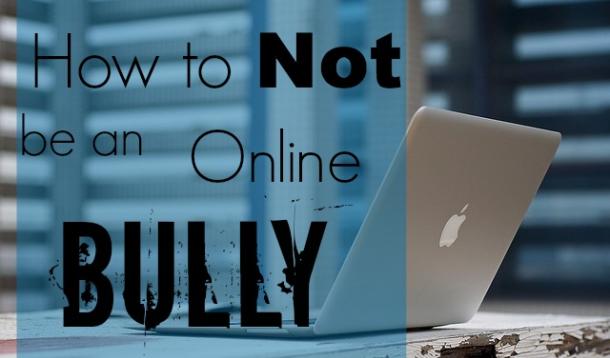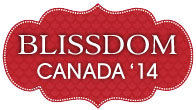
Let's face it, we don't all like one another. Whenever someone says, "Can't we all just get along?" I reply with, "Nope, but we could all try a little respect." I teach my kids that the reality of life is that we won't always like other people. Personalities clash, behaviours don't jive, beliefs won't mesh—whatever the reason, conflict is a normal part of life. But it's how we deal with it that matters most.
It seems like once we sit down behind these screens, some of us forget how to be decent human beings and end up saying really jerktastic things. It's not ok. It's not ok for your kids to be bullies on the playground, it isn't ok for teens to cyberbully fellow students online, and it is mind-blowingly disgusting that there are adults out there who can't manage to behave with decency on the internet, too.
1. Drop the Passive Aggressive Pretense


Let's say you and an acquaintance had a disagreement at a party one night. And let's say that disagreement pretty much solidified the fact that you really don't like the person. If you ran into them at a busy mall the next day, what would you do? I bet you'd pretend you didn't see them, and walk on by.
I'm willing to bet you wouldn't hold your head up like a prairie dog and shout across the crowded space, "HEY, YOU! WHAT YOU SAID IS TOTALLY WRONG AND HERE'S WHY AND LET'S DISCUSS THIS IN FRONT OF ALL THESE COMPLETE STRANGERS, BECAUSE I JUST KNOW THEY'LL ALL SIDE WITH ME AND YOU SUCK!" That's basically what happens when you call someone out on Twitter, Facebook, or anywhere online.
And if that's your style? It is definitely you who sucks. If you've got a beef with someone, discuss it privately. The entire world doesn't need to see your dirty laundry, and we all know there are two sides to every disagreement. Pulling in bystanders doesn't make your point more valid, it just demonstrates that you need a team behind you to bully someone into submission. Not cool.
3. Stop Telling the World You're Unfriending Someone

Remember in grade school when you'd have a scuffle with a friend and announce to your whole class, "Well, I'm not inviting Heather to my birthday party anymore!" Same thing. You don't need to make a grand gesture about unfollowing or unfriending someone—just do it. No need to announce that a massive purging is coming, no need to threaten anyone into shaping up. If someone is that disposable, then just click that unfollow button and move on with your life.
The same advice holds for inviting unfollowers, really. "Don't agree with my stand on [insert cause here]? Unfollowers to the right!" You put the "ugh" in "smug"—just stop it.
If you wouldn't knock on someone's front door to announce that you don't like them enough to be their acquaintance anymore, don't announce an unfollow over social media, either.
4. Use Your Own Face as Your Profile Picture
(source: getmailbird.com)
Logging into an account where your profile photo or avatar is not your face and your name is not your real name can lend a sense of anonymity that I think can be pretty detrimental. If we're not really ourselves, we get to say things that maybe we wouldn't typically say. We think twice when we use our real names and faces, because we're accountable for whatever we type.
Example: There was a time when I had no trouble flipping the bird to other jerky drivers on the road to let them know what I thought about them cutting me off or waiting until the very last moment to merge. But the day I put my company name on my vehicle, it dawned on me how accountable I was for my behaviour and how it affected my reputation. Same thing. It's a good wake up call to realize we're not just anonymous beings in our world.
It's much easier to slam someone under the name RocksSoHard than it would be as ourselves. Be accountable. Be trustworthy online, and be YOU. (Unless you are a total jerkwad, then do not be you.)
5. Before You Comment, Think 
Is what you're about to say going to add positively to the conversation? What is your motivation for saying what you're about to say? Are you angry? How will your words make someone else feel? How would you feel if the words were directed at you? Are you proud of what you're about to say? How would you feel if your child/parent/friend read your words?
Ahhh, maybe you think they will never reach the person you're talking about? Or that they won't read it, or maybe they won't care? Erica Ehm can tell you that's not the case. Sure, when celebrities read the mean tweets people send about them, it's supposed to be funny, but can you really imagine how that feels? It doesn't matter who you are, mean words hurt. And sure, words on the internet are certainly taken with a grain of salt, but it's just plain rude to be nasty online.
6. Say Goodbye to Mary, Mary Quite Contrary, Negative Nancy, & Debbie Downer
(Hey, how come there's no Gary, Gary Quite Contrary or Negative Neil or Donald Downer, anyhow?) Life's not all rainbows and unicorns, we get it. We live it, too. There isn't a person online who hasn't had to deal with illness, or loss, or disappointment, or down times, or a million other things that are on the That Sucks end of the spectrum. That's just life in general, isn't it? And while I know people love to hate on the perpetually happy folks (by blaming them for making their own lives lackluster), adding negativity is never helpful.
Sure, the occasional call out for a little support is a-ok (and, in my opinion, is what makes the online space so amazing, really), but being the constant voice of negativity is a totally selfish, jerk move. People don't come to the internet to feel like crap, we come here to find entertainment, to find support and happiness. And it's a proven fact that happy begets happy, so try spreading a little positivity. You just might be the next Upworthy feature—Person Turns Negativity into Positivity and What Happened Next Will Blow Your Mind!
7. Don't Type What You Wouldn't Say to Someone's Face
What is it that Thumper said his Mama always told him? If you can't say somethin' nice, don't say nothin' at all. This applies. Would you really tell me I'm stupid and my arguments are ill-prepared to my face? Would you honestly sit across from me at a table and tell me I'm a terrible person because I said something with which you disagree? Would you pass me on the street and call me ugly and fat? I sure hope not, because if so, you've got bigger issues to deal with, but the bottom line is that if you wouldn't be able to say something to a person's face, don't write it online.
8. Let People Be "Wrong"
(source: explainxkcd.com)
Also known as challenging your inner Elsa—just let it go. There are things worth arguing about, and things better left alone. There are people who enjoy a good debate, and others love to pick fights. There's an awfully big difference between a healthy debate and a cruel fight. Sometimes it's just not worth the battle. Not everything must be debated to the death. It's ok to not comment on a thread, the world won't implode without hearing your opinion.
If you're reading a blog post and the first word to exit your fingertips in the comment section is, "Actually," it's probably smart to just not leave that comment. It isn't your job to school everyone, everywhere, always. We aren't always going to agree with people, and since opinions are not facts, often it's better to walk away than fight for your right to party, or whatever it is you're arguing about. And also related: don't be too proud to apologize when you've overstepped, and allow others the same courtesy. Sometimes we all forget our manners.
And sometimes silence is the best option.
9. Use Your Powers for Good, Not Evil
(source:allposters.com)
The internet is a pretty powerful thing, used for good and evil every day. We use it to connect with people we'd never have met in the past. We find friends here, and inspiration, we find joy and sorrow and wonder and horror, and everything in between. Given the opportunity to leave behind a positive legacy, I'd rather have that than to be known as a tyrant.
If you have a platform (and we all do, regardless of size), I urge you to use it to promote good things. Be the person you're proud to be, and I think we could see some amazing changes in our online relationships.
10. Speak Up When You Witness Cyber Bullying
(source: bullyville.com)
We teach our kids not to tolerate meanness. We tell them to head straight for a teacher to tell them when another kid is bullying. So why do adults allow it to happen without speaking up? Maybe we're afraid to ruffle more feathers, maybe we don't want to appear aggressive, or maybe we're still afraid of the bullies, just like we were as kids. Whatever the reason, the old adage stands: if you're not a part of the solution, you're a part of the problem.
When I sat in the audience at Blissdom Canada last year listening to Rehtaeh Parsons' father Glen Canning speak about his daughter's experiences that lead to her tragic suicide, I felt absolutely gutted. Where were her peers defending her? Where were the people standing up against what happened? Why did this have to happen? How can we stand by and let people bully another person to the point where suicide feels like the legitimate only way to stop the pain? We cannot let these things happen.
We need to stand up to bullies, to cruelty, to meanness. Speaking up to say, "Hey, that wasn't a very nice thing to say," or "That was a little harsh," can be the difference between someone feeling supported and someone feeling utter despair. It's my belief that every person wants to feel good, and by spreading that goodness, we all get it in return. Stand up against bullies.
As a parent, find out how you can prevent and protect your kids from cyberbullying.
 For more articles, tips, and tricks to help you get organized and make the most of your blog and business visit our BlissDom Canada 2014: How Do You Find Your Bliss? page.
For more articles, tips, and tricks to help you get organized and make the most of your blog and business visit our BlissDom Canada 2014: How Do You Find Your Bliss? page.
Membership Has Its Perks!
We’re offering a special discount for BlissDom Canada to our YMC members. Use our special code for 15% off your BlissDom Canada Conference pass. Find out the details here.
Bonus! BlissDom and YMC want to send you to the conference for FREE this year in the #ThisIsBliss Contest. Have you entered yet?